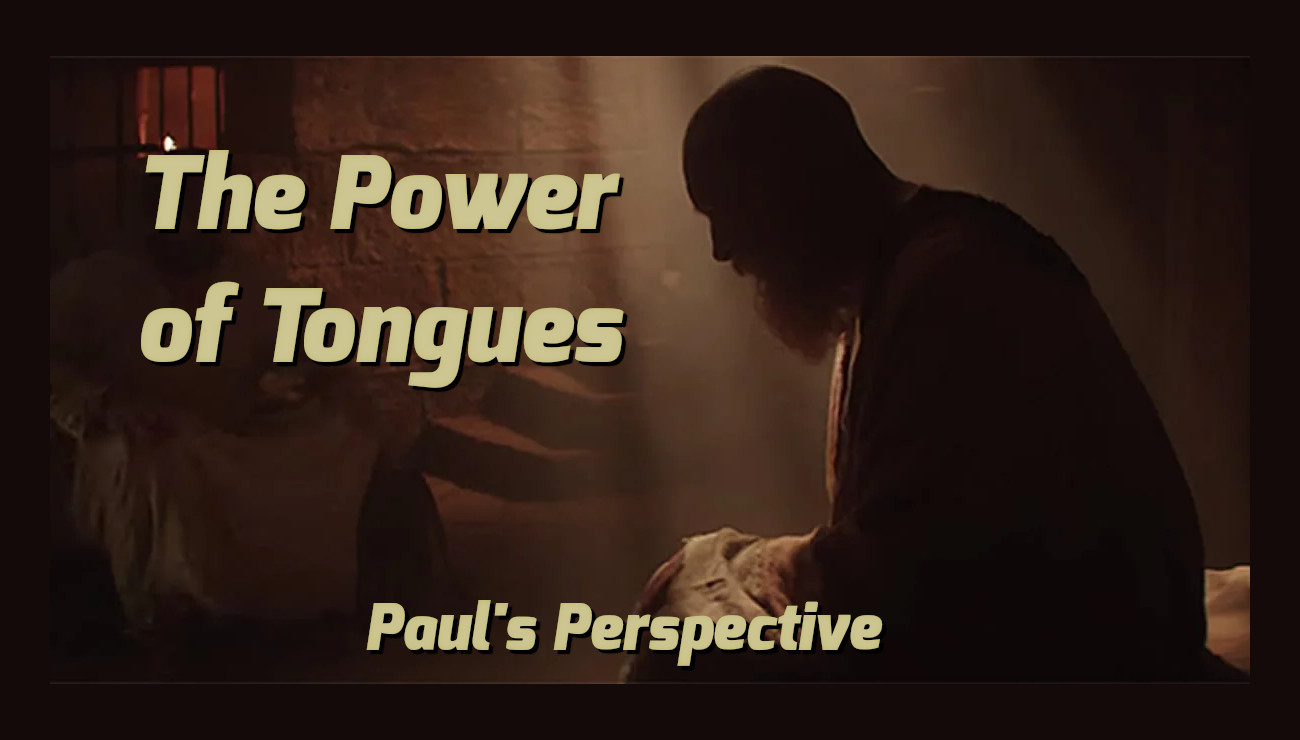
The Power of TonguesWhy Paul Supports Praying in Tongues
- By Lou Comunale
- No Comments
There is so much confusion over the Gift of Tongues in the Body of Christ today. The primary understanding is that Tongues was only used at Pentecost to allow a speaker to supernaturally translate his message into multiple human languages at the same time. But there’s more to it than that.
Let’s get a Biblical Overview for desiring the Gift of Tongues
1) You’ll note in the Spiritual Gifts chapter of 1 Cor 12 that there are “diversities of tongues” (vss 28 & 10). It’s not just one type of operation of tongues. There are several types of the operation of tongues.
2) Yes, one of the kind of tongues is what happened at Pentecost when all of the gathered Christians heard the tongues in their own languages. But that’s NOT the only operation of tongues.
3) In fact, 1 Cor 12 goes on to say that there’s also something called “interpretation of tongues”!
What is that?
Wasn’t tongues supposed to do that? Tongues gave interpretation into various human languages. So why would you need a gift that interprets tongues? Because these are also spiritual tongues that need interpretation! Paul, in fact, speaks of the “tongues of angels.”
4) To prove that there are spiritual tongues needing interpretation, let’s hear from the Apostle Paul: “I thank my God, I speak with tongues more than ye all: Yet in the church I had rather speak five words with my understanding, that by my voice I might teach others also, than ten thousand words in an unknown tongue” (1 Co 14:18-19). Obviously, the tongues he spoke was not an interpretation of a human language BECAUSE NO ONE UNDERSTOOD HIM. This was a Spiritual tongue necessitating the need for the other tongue gift in 1 Cor 12 called “interpretation of tongues.”
This is why the Apostle Paul says, “If any man speak in an unknown tongue, let it be by two, or at the most by three, and that by course; and let one interpret (1 Co 14:27).
This definitely was NOT a human language. If the operation of tongues was ONLY for translations into other human languages, WHY DID PAUL INSIST THAT THERE BE INTERPRETERS of these tongues? If the tongue wasn’t given for any language group present, then why give it?
5) Paul again affirms that some tongues are not a human language when he says in 1 Cor 14:23, “If therefore the whole church be come together into one place, and all speak with tongues, and there come in those that are unlearned, or unbelievers, will they not say that ye are mad?”
Why would the people think them mad? Because they’re hearing tongues that are not of human origin. If they were of human origin, Paul would just tell them, “Oh, we’re speaking Arabic now” – but he doesn’t. This is a Spiritual tongue. Now let’s go onto one final point.
6) You might have missed this in the above quote from Paul. But did you notice Paul saying “I thank my God, I speak with tongues more than ye all: Yet in the church I had rather speak five words with my understanding, that by my voice I might teach others also, than ten thousand words in an unknown tongue”? (1 Co 14:18-19).
Did you catch it? He said, “IN THE CHURCH I would rather speak five words with my understanding than 10,000 words in an unknown language.”
That means that when he’s NOT in Church, he’s praying in tongues!!
When Paul was praying in tongues (or in the Spirit) at home — he did NOT understand what he was praying because it was a spiritual language needing interpretation. “For if I pray in an unknown tongue, my spirit prayeth, but my understanding is unfruitful” 1 Co 14:13).
SEE A REAL-LIFE EXAMPLE OF PROPHECY ABOUT THE CHURCH & AMERICA
GIVEN BY GOD THROUGH THE POWER OF “TONGUES & INTERPRETATION OF TONGUES”
So then why would Paul privately pray in the Spirit at home?
A) Paul is allowing the Holy Spirit to pray through him in order to bypass the limitations of his own human mind: “Likewise the Spirit also helpeth our infirmities: for we know not what we should pray for as we ought: but the Spirit itself maketh intercession for us with groanings which cannot be uttered” (Rom 8:26).
B) Paul is edifying his Spirit. As Jude say, “But ye, beloved, building up yourselves on your most holy faith, praying in the Holy Ghost” (Jud 1:20).
Additionally, let’s confirm the point that one of the diversities of tongues is not of human origin nor for humans. Paul says: “For he that speaketh in a tongue speaketh not unto men, but unto God; for no man understandeth; but in the spirit he speaketh mysteries” (1Co 14:2 RV).
You CAN’T get around this point. Here Paul is saying that he is praying to God with words that are an incomprehensible spiritual language — it is NOT spoken to men, so this can’t be translated into human languages — BUT THIS TONGUE IS FOR AND TO GOD! So that God can release prayers out of our mouths — mysteries that we wouldn’t know otherwise unless the Holy Spirit gave it to us!
So I hope if you’ve read this far that you’ll consider being open for the gift of tongues. Paul spoke in tongues more than others, and he was given great revelations to impart to the Church.
Jesus says that Christians will speak in new tongues! (Mark 16:17) — that’s the Spiritual language. When I pray in the Spirit, I can generally sense the Holy Spirit immediately upon me. That’s conclusive proof of the Comforter alighting upon me. If one doesn’t feel the Holy Spirit immediately, he or she needs to cultivate a practice of praying in the Spirit regularly and it will happen for you too.
“Every gift God freely gives us is good and perfect, streaming down from the Father of lights, who shines from the heavens with no hidden shadow or darkness and is never subject to change” (Jas 1:17 TPT).
Finally, let’s do what Paul says: “forbid not to speak with tongues” (1 Cor 14:39).
Share this now!
Do You Believe Jesus or Pre-Trib Teachers?
admin
Lou Comunale is an analyst of news and biblical prophecy. He began his career working at the news archives for NBC, MSNBC, ABC, & CBS. Then the calling of God prompted him to combine news analysis with biblical prophecies, which actually helps us fully understand the prophetic times we're living in.










